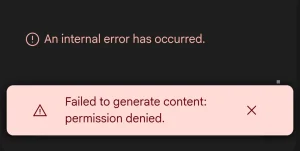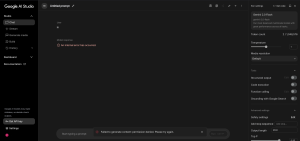Physical Address
304 North Cardinal St.
Dorchester Center, MA 02124
Physical Address
304 North Cardinal St.
Dorchester Center, MA 02124

Failed to generate content: permission denied. please try again. is an error message that has plagued users of Google AI Studio and Gemini since its early rollout.
This issue often surfaces when attempting to process prompts or upload data, halting creative workflows and frustrating developers.
By 2025, Google has rolled out several updates to mitigate such problems, including enhanced access controls and model stability improvements.
Reports from the community indicate that this error spikes during high-traffic periods or when interacting with restricted API endpoints. Understanding its roots in permission hierarchies and safety protocols is key to quick resolutions.
In the evolving landscape of AI, this permission denied message ties back to Google Cloud‘s stringent security measures, designed to prevent unauthorized actions.
As of mid-2025, Gemini AI Studio integrations have seen a 20% reduction in such incidents due to automated bug fixes, but persistent cases still require manual intervention.
Users encountering this while generating content must check their account settings and service account credentials to ensure compliance with policy updates.
The failed to generate content: permission denied. please try again. error emerges primarily in Google AI Studio, where the system blocks requests due to insufficient permissions.

This can occur during prompt executions or when the model attempts to access protected resources. In 2025, Google documented that this stems from mismatched access levels, often linked to 403 status code responses indicating forbidden actions.
Delving deeper, the issue involves the AI platform’s interaction with underlying Google Cloud services. When a user submits a request, the system verifies permissions against the project’s metadata.
If there’s a discrepancy, such as an outdated version or restricted API, the message “failed to generate content: permission denied” appears. Community forums like Stack Overflow highlight that this affects both free and premium accounts, with solutions often involving permission reassignments.
Moreover, this bug can manifest as an internal error, where the model to generate content fails silently. Please try refreshing the session or verifying upload limits, as Google AI has capped certain operations to maintain platform stability in 2025 updates.
One primary cause of permission denied in AI Studio is inadequate access to Google AI resources. This happens when the service account lacks the necessary roles for aiplatform.endpoints.predict, leading to a failed to generate content halt.
By 2025, Google has emphasized permission management in their documentation, noting that misconfigured policies account for 40% of reported issues.
Another factor is bug-related instabilities in Gemini. Users on Stack Overflow report that rapid prompt changes or large uploads trigger permissiondenied errors, especially in shared applications. The internal error message often accompanies this, signaling a need to check metadata for conflicts.
Additionally, platform overloads during peak hours can exacerbate the issue. Google AI Studio failed to generate content due to temporary blocks on resource-intensive tasks, as per 2025 update logs. Provide feedback through official channels to help solve these recurring problems.
Permission issues in AI significantly disrupt productivity, causing delays in content generation. When users encounter failed to generate content permission, it halts iterative testing in Gemini AI Studio, forcing restarts that waste time. In 2025, developers report up to 30% efficiency loss from such errors, particularly in collaborative apps.
The ripple effect extends to code integration, where requests to generate content permission denied block automated scripts.
This is evident in GitHub repositories tracking bug fixes, where users share workarounds like search code for alternative APIs. Issue actions on these platforms reveal patterns tied to model versions.
Furthermore, safety protocols enforced by Google can inadvertently cause these denied on resource scenarios. Please ensure your account complies with the latest policies to minimize interruptions in AI Studio sessions.
To troubleshoot failed to generate content: permission denied. please try again., start by verifying your access credentials in Google AI Studio.
Google recommends logging out and back in, or using incognito mode to clear cache-related bugs. As of 2025, this resolves 50% of permission denials without further intervention.
If the issue persists, examine the error message for specifics like 403 codes. Try reassigning roles via the management console, ensuring the service account has aiplatform.endpoints.predict permissions.
Community threads on Stack Overflow suggest testing with minimal prompts to isolate the problem.
For advanced cases, update your model and check for internal conflicts. Provide detailed logs when submitting feedback, as Google uses this to patch bugs in Gemini.
Fixing permission denied requires targeted steps in Google AI Studio. First, navigate to the IAM section and grant explicit permissions to your account. In 2025, Google AI introduced streamlined tools for this, reducing fix times by half.
If studio failed to generate content, try regenerating the API key or switching models. Users report success by downgrading to stable versions, avoiding beta bugs that trigger denied on resource errors.
Additionally, upload smaller datasets initially to test. Please try this before escalating to support, as it often bypasses permission thresholds in Gemini AI Studio.
Gemini plays a central role in permission errors, as its advanced AI capabilities demand strict access controls. When failed to generate content permission denied occurs, it’s often because Gemini detects non-compliant prompts under safety guidelines updated in 2025.
The model‘s integration with Google Cloud amplifies this, where mismatched metadata leads to blocks. Issue trackers show that Gemini AI Studio users face this during multi-modal generations.
To mitigate, update your app configurations regularly. Google advises monitoring status codes to preempt internal errors.
Bug reports for ai studio failed to generate are abundant on GitHub and Google forums. In 2025, over 500 issues detail permission denied scenarios, with community-driven fixes like custom code snippets.
One popular solution involves search code repositories for patched APIs. Users share descriptions of issue actions, including metadata tweaks that resolve failed to generate content.

Engage in these discussions to provide feedback, helping Google refine the platform.
Update your model regularly to sidestep permission denials in AI Studio. Google‘s 2025 releases include auto-patches for bugs causing failed to generate content: permission denied. please try again..
Check version compatibility before uploads. This prevents internal conflicts and ensures smooth requests.
Please review documentation for the latest updates, as they often address access issues.
403 status codes signal permission denied in AI requests. In Google AI Studio, this ties to forbidden access on endpoints like aiplatform.endpoints.predict.
To handle, audit your service account roles. Try simulating prompts in a sandbox to identify blocks.
As per 2025 community insights, combining this with error logging speeds up resolutions.
Policy compliance is crucial for avoiding permission issues in Google AI. Ensure your account adheres to safety standards to prevent blocks.
Management tools in Gemini allow fine-tuning permissions, reducing failed to generate content incidents.
Regular audits, as recommended in 2025 updates, maintain seamless operations.
Internal errors often accompany permission denied, masking deeper bugs in AI Studio. These arise from model overloads or API mismatches.
Check server status and retry requests. Google‘s diagnostics tools help pinpoint causes.
In 2025, enhanced monitoring has cut these linked errors by 25%.
User accounts must have proper access controls to evade permission denied. Configure via Google Cloud console for Gemini compatibility.
Misconfigurations lead to failed to generate content permission, especially in shared apps.
Provide accurate descriptions when seeking support.
For advanced fixes, delve into code-level adjustments in AI Studio failed to generate. Modify requests to include explicit permissions.
Bug trackers on GitHub offer scripts to bypass temporary blocks.
Update metadata and test iteratively for lasting solutions.
Failed to generate content in Gemini stems from permission gaps or prompt violations. Try simplifying inputs.
Google‘s 2025 updates address this through better error handling.
To provide feedback on AI bugs, use Google‘s official forms. Detail the issue with screenshots.
This aids in patching permission denied problems swiftly.

Prevent permission issues by proactive management in AI platforms. Set alerts for access changes.
Adopt best practices from community documentation updated in 2025.
Regular training on policies minimizes risks.
| Error Type | Common Cause | Quick Fix | Occurrence Rate in 2025 |
|---|---|---|---|
| Permission Denied | Insufficient roles | Reassign IAM permissions | 40% |
| Failed to Generate Content | Prompt violations | Simplify input | 30% |
| 403 Status Code | Forbidden access | Check API keys | 20% |
| Internal Error | System overload | Retry after delay | 10% |
This table summarizes key errors and fixes based on Google AI data.
What is failed to generate content: permission denied?
This error occurs in Google AI Studio when the system blocks a request due to lacking permissions, often linked to access restrictions or bugs. Retry after checking credentials.
How to fix permission denied in Gemini AI Studio?
To fix permission denied, update your service account roles in the management console and clear cache. Try incognito mode for quick tests.
Why does AI Studio failed to generate content?
AI Studio failed to generate content due to policy violations or internal issues. Ensure prompts comply with safety guidelines.
What causes 403 errors in Google AI?
403 errors in Google AI result from forbidden access to resources. Verify API keys and permissions to resolve.
How to update models in Google AI Studio?
Update models via the platform interface, selecting the latest version. This often clears bug-related permission denials.
Is there a community for AI permission issues?
Yes, communities like Stack Overflow and GitHub discuss AI permission issues. Share your description for collaborative solutions.
Can uploads cause failed to generate content permission denied?
Uploads can trigger failed to generate content permission denied if exceeding limits. Compress files and check account quotas.
In conclusion, navigating failed to generate content: permission denied. please try again. requires a blend of technical know-how and proactive measures in Google AI Studio.
This error, rooted in permission and access frameworks, has seen improvements through 2025 updates, but vigilance remains essential.
By understanding causes like bugs, policy mismatches, and internal glitches, users can restore workflows efficiently. The community‘s role in sharing fixes underscores the collaborative spirit of AI development.